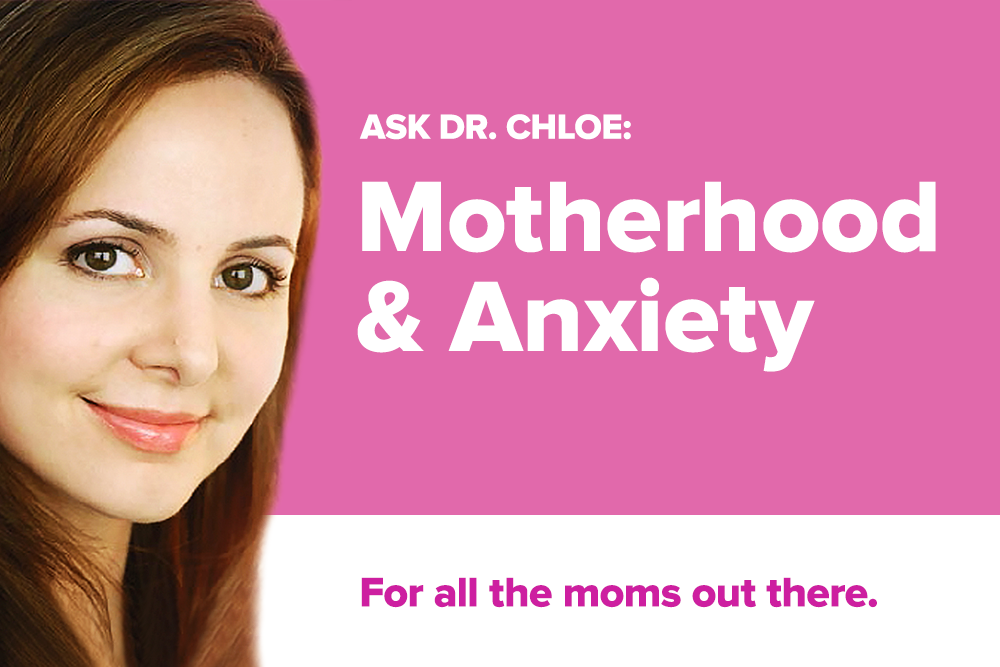A 2007 study found that more than 20% of the pregnant mothers screened showed symptoms of an anxiety disorder, panic attacks, or depression. These numbers are high, but not all that surprising considering the mental strain that can accompany pregnancy and motherhood. To address this, this week on Ask Dr. Chloe, she answers questions about anxiety, depression, and panic attacks in relation to motherhood and pregnancy.
Dear Dr. Chloe,
I’ve had anxiety and panic attacks my whole life. They go away for a while and often come back out of nowhere. As soon as I got pregnant and had a baby, they came back and got worse. My baby’s dad and I are going through a lot and he won’t step up and be a dad or help me at all. One week we’re together, the next we’re not. Sometimes I won’t see or hear from him for weeks at a time, if not longer. He calls me names, threatens me, puts me down, and makes me feel horrible about myself. I’m a new mother and could really use some help, advice, and guidance.
-Kerri
Dr. Chloe: Thank you for that question. I’m glad that you decided to write in and get some support. You started off your letter saying that you suffer from panic attacks that come out of nowhere, and then go on to say:
-
- You recently had a baby
- Your partner is not supportive to the point that you’re serving all the responsibilities as a single mother
- Your partner is verbally and physically abusive
It doesn’t sound like this panic is coming out of nowhere. Frankly, it sounds like your partner has legitimately caused you alarm. And, in my opinion, it makes perfect sense for you to feel like this. Going forward, when you get into a state of panic, consider thinking about what is at the root of your anxiety.
Perhaps your anxiety is trying to mobilize you to set up better boundaries, or to literally create a safer space for you and your baby. I suggest that you take steps to get yourself into a clear mental state. In your situation, you can get both emotional (therapy) and practical support. Contact the hospital where you delivered your baby: the social work department can get you connected with some supportive resources.
Anxiety.org asks: What should a woman do if she recently had a baby, is a first time mother, and is not getting along with the father? Many people find themselves in a position where they want to stay together because they want a family for the baby, need financial support, still love the father, or other reasons. Do you think that Kerri should break up with her partner and move on?
Dr. Chloe: Yes, those are important questions. I’d like to bring attention to the multiple layers of Kerri’s situation. It’s completely normal for parents to feel some stress after the birth of a baby. And for both partners, the birth of a baby can even stir up childhood issues that haven’t been thought about for a long time.
So sometimes when new parents need their partner’s support the most, their partner might also have a lot of other things to chew on, and may not be able to provide a lot of support. In non-abusive familial situations, when normal growth challenges are arising it’s important for a couple to not fault the relationship or their bond, but understand that this is a normal part of process. It could, however, be a good time to get some support as a couple.
But this situation is different – there is a presence of abuse that is not only dangerous to the couple, but also to the baby. I’d say whether or not they can even attempt to patch up their relationship is going to depend on the partner’s willingness to address his typical behaviors. That might mean enrolling in a formal anger management program. In any case, removing the baby from the abusive environment is the first priority.
Dear Dr. Chloe,
Can anxiety and depression hurt a fetus when he or she is unborn and still developing? And if you take medication, what are the risks for the baby?
-Elizabeth
Dr. Chloe: The link between maternal depression rates and fetus development is actually a new topic of study which researchers are just starting to delve into. Since around 2004, research has shown that babies born to mothers with clinical levels of anxiety and depression often have different cortisol (the stress hormone most commonly associated with anxiety) levels from babies born to mothers without mental illness.
Assuming you are asking on your own behalf, I’ll speak directly to you and say, yes, a mother’s mental health can affect her developing fetus. For that reason, I would recommend that you get some support for your sake and the sake of your baby.
As for your question about taking medication while pregnant: you should know that while the medication can help with your mood, it might act as a teratogen, or a substance that can have a detrimental effect on the fetus. This is a really complex question that needs the input of your doctor. Every woman is different. Every woman is on a different dosage on a different medication, and everyone has a different history. Opting out of medication can cause problems for you, but can also protect the developing baby from the medication’s side effects.
The best thing for you to do is to have a very open discussion with your doctor where you can discuss your concerns and any dangers to you or the baby. Ask your doctor to come up with a solution that’s going to help both of you. And whatever you do, in addition to seeing your medical doctor, please see a therapist. Whether that’s a social worker, psychologist, or counselor, you need and deserve the guidance and emotional support that person can provide.
Anxiety.org asks: Dr. Chloe, do you think pregnant women should see a nutritionist? We’ve read recent research that states pregnant women are not getting enough Omega-3s, which is essential for the brain functioning of both the mother and the developing baby. Many woman believe they cannot eat sushi while pregnant for fear of mercury poisoning. With fish being a main source for Omega-3s, pregnant women who avoid fish often become Omega-3 deficient.
Dr. Chloe: Absolutely! I can’t think of a better time for a woman to see a nutritionist than when she is pregnant. I’d encourage her to research and learn about the different credentials associated with nutritional support. For example, a nutritionist and a certified health counselor are going to have different credentials, areas of expertise, and levels of schooling. I often recommend my clients see a nutritionist because there is a big connection between what we eat and how we feel. So yes, I would definitely recommend seeking nutritional support for pregnant women.
Dear Dr. Chloe,
I had depression during my pregnancy and postpartum depression after I delivered my son. I feel it affected him because he’s developing slower than his siblings. He’s currently 2.5 years old and he doesn’t speak a lot, often holds his breath until he turns blue, and gets the chills. My pediatrician just says that he behaves this way because he’s angry. I don’t know what to believe.
-Elizabeth
Dr. Chloe: Elizabeth, the idea of a toddler turning blue because he’s angry doesn’t make any sense to me. I would bring him to another pediatrician to have a second opinion. If that is indeed the case, then the next stop would be to bring him to a pediatric psychiatrist, pediatric psychologist, or even to a pediatric social worker. With that level of disturbance, it sounds like your child is showing some signs of distress. Turning blue from anger is not normal. It’s great that you are noticing and attempting to remedy the situation. I want to encourage you to keep bringing your child to doctors with the question, “How can you help me with this?”
Anxiety.org: If a doctor dismisses a problem, it sounds like you recommend that a person seek a second opinion. In Elizabeth’s case, this second opinion involves going to see a child psychologist, pediatric psychiatrist, or someone who specializes in child psychology. Pediatricians and general practitioners are responsible for a wide range of medical knowledge. However, no one has all-encompassing medical knowledge – one doctor might not know the exact cause of a problem. If he or she doesn’t know, ask another doctor and don’t stop until you find the solution.
Dr. Chloe: I’d also like to tack onto that. Elizabeth should consider seeing another pediatrician because turning blue obviously triggers concerns that there is an issue with oxygen. In many ways, turning blue does sound more like a physical issue that needs medical consultation. It does sound strange that a pediatrician would say it’s just anger. I fully support the idea of getting additional medical opinions.
You’d be surprised how often I’ve had clients come into my own office for other issues like, “I thought I had cancer and I went for a screening. I was told I did not have cancer, but six months later I found out I really did.” If there’s an issue going on and your alarm bell is ringing, follow your intuition.
Dr. Chloe Carmichael, Ph.D, is a licensed clinical psychologist, known as Dr. Chloe. She holds a master’s degree and Ph.D. in clinical psychology from Long Island University and graduated Phi Beta Kappa, summa cum laude, with a bachelor’s degree and departmental honors in psychology from Columbia University in New York. Her practice in New York City employs multiple therapists to serve high-functioning business executives, people in the arts, and everyday people seeking support with personal or professional goals.
Dr. Chloe is the author of the book Nervous Energy: Harness the Power of Your Anxiety, endorsed by Deepak Chopra! She is a member in good standing of the American Psychological Association, as well as the National Register of Health Psychologists, an elite organization for psychologists with gold-standard credentials. She is also a consultant at Baker McKenzie, the third largest law firm in the world.
She is an Advisory Board member for Women’s Health Magazine (Hearst), and a featured expert for Psychology Today. Dr. Chloe enjoys relating with the media, as well as public speaking. She has been featured as an expert on VH1, Inside Edition, ABC Nightline and other television; and has been quoted in the New York Times, Forbes, Vanity Fair, Shape, Cosmopolitan, Rolling Stone, and other print media.





